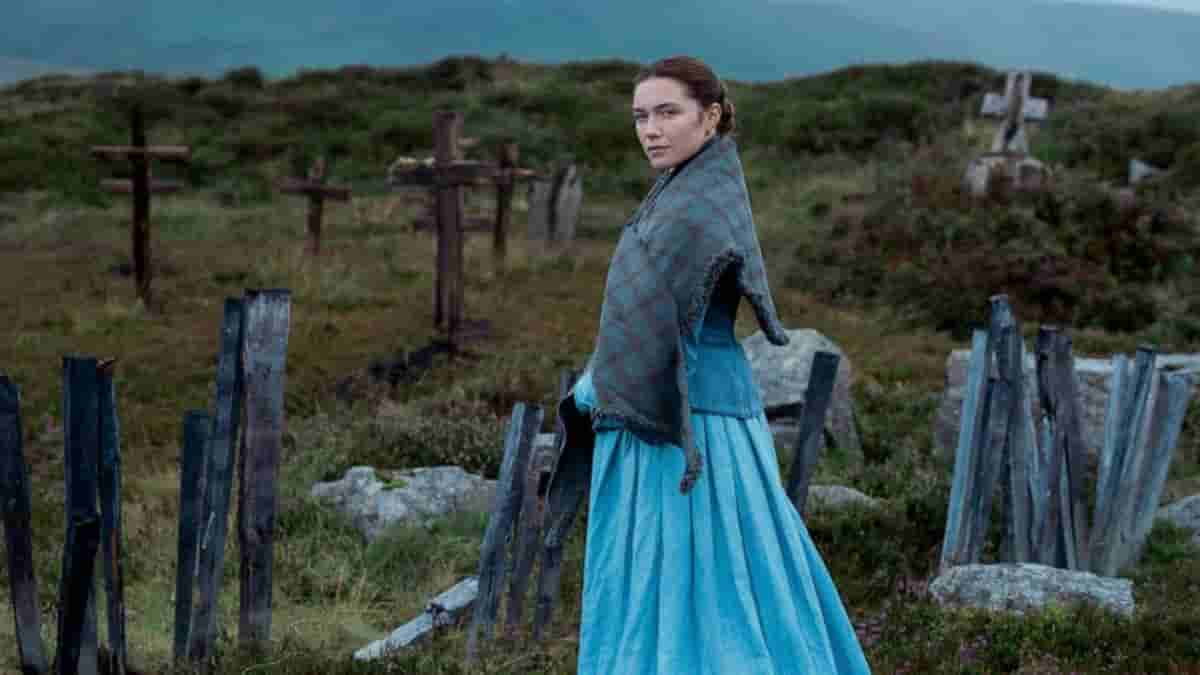Anna O’Donnell doesn’t eat food. In Sebastián Lelio’s brooding, reclusive drama, a nurse named Elizabeth Wright (Florence Pugh) has only been given that information, not that her medical knowledge allows her to believe it for a second. She has been called from London to a distant Irish village.
In 1862, just before the Great Famine, the people are still not particularly happy to see a British citizen wearing any kind of uniform. Elizabeth, or Lib, as she eventually permits her young patient to call her, feels the same way. She is unsure of why she has been sent to this underdeveloped outpost for a case that is obviously based on faith rather than science, and she is also unsure of whether it is even worthwhile to try to affirm her expert knowledge in a spot where a woman’s sentence has hardly been treated more seriously than a dog’s.

She nonetheless consents to supervise 11-year-old Anna (Kla Lord Cassidy) for two weeks without meddling, sharing the responsibility with a nearly silent nun who is brought in. And Anna looks like a kind girl if an extraordinarily religious one. She tells Lib beatifically that she survives on “manna from heaven,” which is more soul-satiating than any food from the earth. That is obviously impossible, but the group of local (and obviously all-male) grandees in control of the inquiry, including an obstinate doctor (Toby Jones) and the somber parish priest of the O’Donnells (an underutilized Ciarán Hinds), each has their own more or less absurd hypotheses.
The more time Lib spends circling the girl’s secret, the further away she feels from the origin, though she has trouble explaining this to the rakish skeptic journalist named William Byrne who has arrived at her boarding house from London with the intention of finding the truth. Anna is “a jewel, a wonder” to the locals who come to pay respects or simply bask in the presence of a sanctified kid who seems to have her own direct path to God; to William, she is a “wee faker.”
For Lib, she is first a conundrum to be solved before gradually becoming the focus of genuine pity. Perhaps this is a result of her own suffering; while in public she is stern and guarded when she is by herself at night in her room, the woman who has assured her hosts that she is a childless widow performs a strange ritual that entails the meticulous, almost holy placement of a tiny pair of woolen baby booties as well as a spoonful of a heavy syrup that causes her to swoon.
Numerous books and academic articles have been written about the 19th-century phenomena of so-called “fasting girls,” who were typical teenagers consumed by religious fervor or, more likely, merely resenting the restrictions of their Victorian lives. One of those tales served as the inspiration for Emma Donoghue’s (Room) 2016 book The Wonder, whose source material seems like perfect material for Oscar-winning Chilean director Lelio, whose talent for inhabiting the female gaze was exemplified in movies like Gloria, A Fantastic Woman, and Disobedience. With its windswept moors and flickering, fire-lit shadows, the lavish cinematography by Ari Wegner (The Power of the Dog, Zola) gives the landscape the appearance of a Brönte novel. Pugh is also essentially wonderfully cast; as an actor with such a strong emotional presence, she has a tendency to cut pretense and insignificance like a hot knife.
Lelio frames everything through a meta-modern lens, wrapping up the film with a self-conscious narrative voice about “telling stories,” and trying to pull back to unveil the stage set with all its structural support, wires, as well as backlot debris for reasons that remain a mystery. The script, however, feels both less daring and less fully developed than the central star’s performance. For a director whose perspective with his own content has been so unique and sensitive, it’s a curious choice and not a very organic one. Instead, Wonder’s spare, understated allure depends mainly on Pugh and the surrounding environment, an elusive, minor-key enigma.
Read Also – Here Is The Review Of Killer Sally For You
















